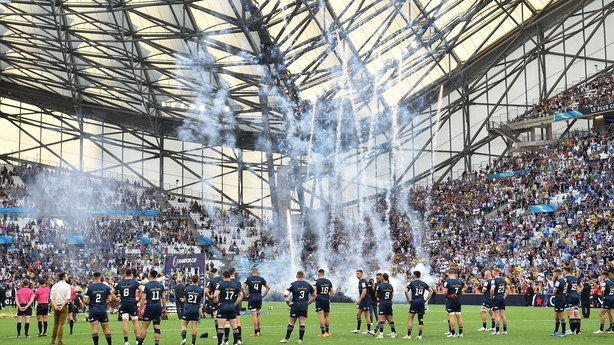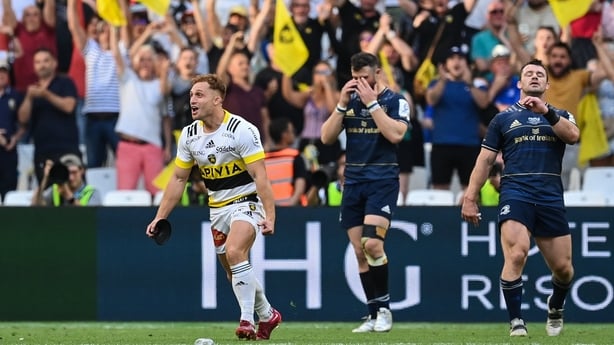If you tried to sum up Saturday's Heineken Champions Cup final in a sentence, you'd make little or no sense.
Leinster were played off the park, but yet they still should have won. They led for 70 of the 80 minutes, but had they won they'd have stolen it. Nobody ever said sport and logic were joined at the hip.
To make a further contradiction, Leinster conceded three tries to nil, were tormented by wingers Raymond Rhule and Dillyn Leyds, yet had they won their defence would have been heralded as the reason they did it.
Their desperate, frenetic, aggressive tackling in the final quarter of an hour was incredible at times, the irony being that when their line was finally breached by Arthur Retiere for the most famous try in La Rochelle's history, it was a result of him losing his footing and falling out of the way of Garry Ringrose's tackle.
On 68 minutes and 41 seconds Ihaia West kicked a penalty down into the corner, and the remainder of the game was played entirely within 10 metres of the Leinster tryline. The four-time champions never touched the ball for the rest of the game, making countless tackles but giving up penalties, as La Rochelle picked and drove, and picked and drove, and picked and drove. Ronan O'Gara laughed that they seemed to carry the ball 150 times in that mammoth stand. He might not have been far wrong.
Had Leinster's defence caved earlier, they'd have only been three points behind with a few minutes on the clock to chase it. It would take a brave and foolish person to suggest letting La Rochelle walk one in though.
As much as La Rochelle dominated from a rugby perspective, there were more than enough missed opportunities that Leinster will feel sick to have let slide.
Their handling and passing was nowhere near their usual standards, with forwards often having to check their runs to catch the ball rather than take it in stride. Ross Byrne's sloppy knock-on in midfield on 65 minutes gave La Rochelle which led to their extended possession and territory late on.

There were so many of those uncharacteristic moments; The second La Rochelle try can be stemmed back to Johnny Sexton's indecision when catching Brice Dulin's shanked dropgoal attempt. At that point Leinster were 18-10 in front and looking like they were primed to close things out.
"At 18-10 we looked in control," Leo Cullen said after the game.
"A few decisions, a bounce of a ball, fine margins. Prior to that there are a few things in the game, we camped on their line, a similar situation to them at the end of the game. We built the scoreboard pressure, which was the right decision. There are a few parts of the game we don't manage well, and we get ourselves in trouble."
Worryingly, their failings were largely similar to those when the sides met in last year's semis in France; the scrum struggled, particularly late on under Cian Healy and Michael Ala'alatoa's watch, while they were beaten in the close-quarter exchanges.
The fact they made 210 tackles compared to La Rochelle's 87 tells it's own story.
"You can't fault the effort. There are bits in the game that we don't quite execute at stages. Different parts of our game that puts us under undue pressure, but that's what you're expecting with this kind of game anyway, it's high stakes and high pressure against a French team, away in France.
"We'd love to have a crack at it again, but you don't get a second chance in finals, do you?," he added.

They have the deepest squad in the URC, having used 60 different players across the course of the season, but it's notable how reluctant they were to use their bench, when it was clear fresh bodies were badly needed in the final quarter. Luke McGrath was trusted with just five minutes, and the scrum-half never even got to touch the ball, though he did hit everything he could with six tackles.
Likewise, Joe McCarthy was only called upon in the final four minutes, while Ciarán Frawley - preferred to Jordan Larmour in the 23 shirt - never even got to play. While Rhys Ruddock and Healy both made tackle after tackle in that late defensive stand, the second half substitutes either failed to make the desired impact or weren't trusted enough to do it.
The defeat is also sobering on a wider scale ahead of Ireland's tour of New Zealand, and All Blacks head coach Ian Foster will have watched on with interest as he saw the vast majority of the Ireland starting line-up neutered in attack.
After the game, Sexton pondered if they may have been wiser to go for the jugular with some of their penalties rather than taking the safer option of a kick at goal, but with each of his six kickable penalties coming directly in front of the posts, the easy-threes would always be hard to turn down in a final.
One even wonders if there was a bit of double-bluff going on from La Rochelle's part. Their discipline was always at its worst in the centre of the pitch, enough of a temptation for Leinster to kick at goal rather than to the corner.
For this generation of Leinster players it's now one win out of three in Champions Cup finals, and they have won four in a row in the URC and are quite likely to make it five in a few weeks, they're judged off Champions Cup, and in three straight years they have been beaten when expected to win.
To say Leinster 'bottled' it would be an insult to La Rochelle performance, and the way they targeted and executed their plan. They dismantled Leinster's game for the second year in a row, and that doesn't happen often.


